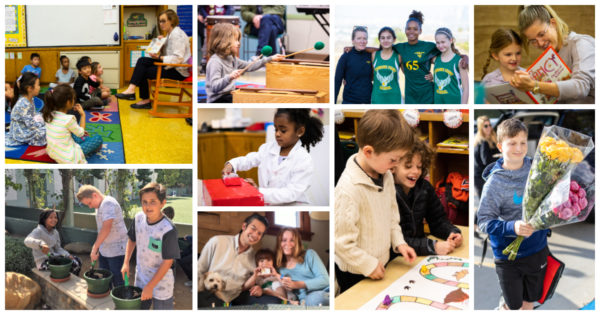
After a lifetime of fits and starts, I have been meditating daily for the past three months. Several forces united to prompt me to codify this habit: irrefutable scientific evidence that it’s beneficial; colleagues engaging in their own practice and beginning to teach mindfulness in the classroom; friends who swear by it; and the desire for a more extensive repertoire of tools to help me respond—rather than react—to the unknown and uncontrollable in a positive way.
Very much concerned with the epidemic of anxiety and depression among our young people, I have been thinking about how to dial down the level of stress they experience, which can often be caused by the seemingly constant pressure they can feel to “get it right.” If you are a (recovering) perfectionist like me, you know how critical we are of ourselves and how much pressure we put on high levels of performance and achievement. Perfectionists get stuck in a fixed mindset and can break, rather than bend, under stress. Wouldn’t it be wonderful to give our children—and ourselves—permission to hit the reset button by practicing the art of failure and resilience? We can, through meditation.
One thing I love about meditation is the directive to “begin again.” Each moment meditating gives us the chance to learn how to begin anew when we get distracted and return to observing what is going on in our mind. Sam Harris, a philosopher and neuroscientist, puts it like this: “In this clear noticing, we are training our minds, practicing a willingness to return to the present moment without judgment, without disappointment.” Removing judgment and disappointment allows us not to wallow in the past or project into the future. It permits us a second chance, and then a third, and then as many as we need to come back to the present and restart the clock.
Intertwined with resilience is forgiveness. Harris points out that the only way to forgive someone else or ourselves is to start over, and argues that the habit of beginning again creates a sense of resilience “we can’t otherwise find.” When we discover ourselves in a conversation that has withered, notice we have wasted time surfing the internet, lost our patience, or spaced out when playing a board game with our children, we can notice our lack of focus and commit to beginning again and to connecting with an experience in the present moment. We have hundreds of opportunities each day to practice the act of starting again, and each time, we strengthen our resilience muscle and create opportunities to forgive ourselves and others.
While I have not been meditating long enough to notice profound changes, I have seen small shifts: my response time is a bit longer, and I have become more aware of making reasoned choices rather than reacting; I have learned that moving through painful experiences with intention and attention brings a quicker and more satisfying resolution; I have increased willingness to accept myself as flawed and growing.
Whether or not you adopt meditation as a formal practice in your own life, there are certainly ways to draw upon the tenets of mindfulness to be more present and centered, even if it is just taking that extra pause to close your eyes and take a few deep breaths. I hope you will spend time this summer enjoying and savoring as many real-time moments as you can and finding ways to let go of the way you think things should be and rather experience them as they are. I look forward to sharing stories from summer—not where you went, but how you were when you were there.
Warmly,
Laura
Laura Konigsberg
Head of School
lkonigsberg@turningpointschool.org
Helpful Resources
Mindfulness for Children
“Children of all ages can benefit from mindfulness, the simple practice of bringing a gentle, accepting attitude to the present moment. It can help parents and caregivers, too, by promoting happiness and relieving stress. Here, we offer basic tips for children and adults of all ages, as well as several activities that develop compassion, focus, curiosity and empathy. And remember, mindfulness can be fun.”
What Type of Meditation Is Best for You?
“One of the most in-depth meditation studies to date shows that different practices have different benefits.”
Meditation Apps for Kids
Kids of all ages can reap the benefits of meditation and mindfulness using technology. Meditating even only a few minutes a day has proven to reduce stress, boost immunity, aid memory and concentration, decrease depression and anxiety, and even make you more compassionate. Don’t know where to start? Check out some of Common Sense Media’s favorite meditation apps for kids.
The Best Meditation Apps of 2019 (for adults)
Meditation is a simple way to reap big benefits. But where do you begin? And how do you know exactly what to do? Good news — there’s an app for that!
Michigan State University | Resources for Stress Reduction and Mindfulness
Scroll down to “Mindfulness Apps” and “Guided Meditation” for some great free resources.


































